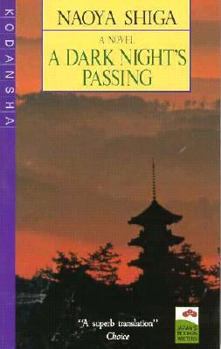A Dark Night's Passing
Select Format
Select Condition 
Book Overview
Tells the story of a young man's passage through a sequence of disturbing experiences to a hard-worn truce with the destructive forces within himself. This description may be from another edition of this product.
Format:Paperback
Language:English
ISBN:0870113623
ISBN13:9780870113628
Release Date:January 1993
Publisher:Kodansha
Length:408 Pages
Weight:0.78 lbs.
Dimensions:1.2" x 4.5" x 7.2"
Customer Reviews
2 ratings
A Used Bookstore Gem
Published by Thriftbooks.com User , 22 years ago
... I was blown away. I really, really enjoyed it, and it makes me really wish that Shiga had used his enormous talent to write more books. The premise of the book is pretty simple. We start off with a young man named Kensaku, who after his mother dies moves in with his paternal grandfather. He resents his father for this because he is the only one of the children who is forced to move in with the old man. Kensaku never learns to like his grandfather, but does like Oei, his grandfather's 20 year old mistress. Warp ahead several years, We find Kensaku still living with Oei, and making a living being a writer. He has not written anything major, but has contributed short works to several magazines. The book goes on from there. The reader experiences the agony Kensaku goes through when he finds out the circumstances of his birth, his lust for Oei. His finally marrying someone he loves only to have it marred by the death of his son. The torment he goes through when his young wife Naoko is raped by her cousin. A wonderful book. Shiga, although he wrrote much less, belongs in the same group as Mishima, Kawabata, and Tanizaki as one of the great japanese writers of the modern era.
Why didn't Shiga write any more novels than this?
Published by Thriftbooks.com User , 29 years ago
Perhaps one of the best of Japan's interwar novels, "A Dark Night.." takes the reader directly into the mind of author Naoya Shiga who lived in similar circumstances with the main character Kensaku. It is provocative in the way the author makes Kensaku grapple with himself concerning so moral questions that prop up through the course of his adult life until his presumed death at the end. The writer-bohemian Kensaku, who can arguably be taken for the real Naoya Shiga (Edwin McClellan defines this novel as a watakushi-shosetsu in form but not in substance), is at once a critical yet sympathetic description of the modern intellectual who consciensciously takes up both sides of the dilemmas that confront him but inexorably fails to heed his better judgement. Yet for all his debauchery the reader will most likely be delighted of his almost school-boyish courting of his his future wife and in the end be relieved that it was Naoko and no other who rescued him from his eternal quandary about women (starting from his mother and questionable birth). This novel can in some ways be compared and contrasted to Milan Kundera's "Unbearable Lightness of Being" in its views about women. Much has been made about the inconclusiveness of this 400-plus paged novel but I am of the opinion that to have dragged on would just have produced redundant statements to the eventual ending. This novel also provides a very detailed picture of prewar Japan, especially in its desciptions of the old Tokyo quarter (shitamachi) and outlying areas including Yokohama and Kamakura. As Kensaku does a bit of travelling by train and boat from central Honshu to Shikoku and parts of Kyushu, this book may also make for a sort of travel diary. Of particular interest are the descriptions of Onomichi in Hiroshima prefecture and Mt. Daisen in Tottori. Lastly, all of this is brought together in clear and elaborate prose by Mr. McClellan. I have read numerous Japanese works in English and never have I been so impressed as I was with this translation. It fills up all of the gaps, in particular social and cultural references in speech inferred only in the abrupt Japanese original. In all, a convincing work that Shiga Naoya should have written another novel apart from this.





